外研社小学五年级英语复习资料
外研社英语(3起点)五年级上册知识点精华归纳

外研社英语(3起点)五年级上册知识点精华归纳外研社三起点五年级英语上册知识点归纳一、重点短语:1、eback回来2、lookatsb/stn3、waitforsb4、hurryupModule 1ebackfrom+某地看某人/某物等候某人赶快给某人打电从某地回来5、phonesb=callsb二、重点句型:1、--Did you e back yesterday?--No,we came back last Sunday.2、Let’sbuysome.<Let’s+动词原形让我们做······去吧.〕三、重点语法:一般过去时一般过去时〔动词+ed〕动词过去式〔动词+ed〕规如此:1〕、间接加-ed比方:looked,played2〕、去e加-ed比方:moved3〕、变y为i加-ed比方:carry-carried4〕、双写加-ed比如:planned5〕、不规如此变化比如:run-ran,swim-swam一般过去时句型结构:.肯定句:主语+动词过去式.否认句:主语+didn’t<did not>+动词原形.一般疑问句:Did+主语+动词原形?Yes,主语+did./No,主语+didn’t.Module 21、重点单词、短语:1、buy some fruit买一些生果2、make a shopping list制定一个购物清单3、also也,放句中.too也,放句末4、half a kilo半公斤5、a lot of=lots of许多接可数名词复数或不可数名词二、重点句型:1、--What did you buy?--I bought some apples.2、--How many bananas did you buy?--We didn’t buy any bananas.注:How many +可数名词复数+一般疑问句?3、--How much cheese did you buy?--Half a kilo.注:How much +不可数名词+一般疑问句?回答用half a kilo /数词+kilo<s> /数词+bottle<s>.3、重点语法:非凡疑问句1.特殊疑问句构成:非凡疑问词+普通疑问句?回答时,根据具体情况回答.2.非凡疑问词:what甚么、who谁、whose谁的、why为甚么、how如何where、那里When甚么时分Module 31、重点短语:1、at the weekend在周末2、visit lots of places参观许多地方3、take a boat trip坐船旅行4、have a good day渡过舒畅的一天给或人/某物照相5、take a photo of sb/sth3、重点句型:1、--Where did you go?--We went to the British Museum.2、--How did you go to these places?--We went by bus.3、What did you do at the weekend?.4、They arrived there at ten o’clock.Module 4一、重点短语:1、buy sth for sb=buysbsth给某人买某物my我的our我们的2、a pair of+复数一双your你的your你们的a pair of shoes/socks一双鞋/一双袜子his他的her她的its 它的their他们的a pair of shorts一条短裤Module 53、want to do想要做某事一、重点短语:二、重点句型:1、giveout分发--What’s the matter?--I lost my cap.What’s the matter<with sb>?3、重点语法:物主代词物主代词:透露表现"或人的〞,背面跟名词. .2、allright好的在你班上3、inyourclass4、somany+可数名词复数如此多....2、重点句型:1、How many faces can you see?2、There are only nineteen crayons.3、--How many pupils are there in your class? --There are fourteen.三、重点语法:There be句型There be句型:表示"某地有某...〞.常用结构:There is/are+某人/某物+地点.There is+a/an+可数名词单数+地点.There is+a/an+不可数名词+地点.There are+可数名词复数〔+s/es>+地址.Module 6一、重点短语:1、runfast跑得快跑得真快,跑得很快传球传得好踢球踢得好runreally/very fast2、pass theballwell3、playfootball well4、jump high跳高.jumpreally/veryhigh5、begoodat擅跳得真高,跳得很高长二、重点句型:1、--Can you pass the ball well?--Not very well.2、You are very good at basketball.=You can play footballwell.三、重点语法:情态动词cancan"能,能够,可以,会〞,后面跟动词原形肯定句:主语+can+动词原形.否认句:主语+can’t+动词原形.<can后加not,其余不变〕一般疑问句:Can+主语+动词原形?<can提前,其余不变〕Yes,主语+can.No,主语+can’t.Module 7一、重点短语:1、help a lot匡助很大2、help sb帮某人3、a TV showaboutdogs二、重点句子:1、This man is can’t see.2、--Can we have a dog?--No,we can’t.一个关于狗的电视节目.3、重点语法代词宾格:透露表现或人,作宾语用.me我you你him他her她it它us我们you你们them他们Module 8一、重点短语:1、what time is it?几点了?2、be late for school上学迟到3、at half past seven在七点半4、do exercise做操do morning exercises做早操5、want to do想要做某事二、重点句型:1、--What time is it now?--It’s half past eight.--What time is it now?--It’s +工夫点.2、--What time do you get up?.--I get up at half past seven.3、She always wants to walk.三、重点语法:一般现在时一般现在时:表示经常发生的动作或目前的状况.第三人称单数做主语,动词词尾加"s〞动词词尾加"s〞规如此:1〕间接加"S〞2〕以o、s、x、sh、ch结尾,加es3〕"子音字母+y末端〞,变y为i加es一定句:主语<三单〕+动词〔+s/es〕+别的.承认句:主语<三单〕+doesn’t+动词真相+别的.〔句中加doesn’t,动词复原,别的稳定〕一般疑问句式结构:Does+主语+动词真相+别的?〔句首加does,动词复原,别的稳定〕Yes,主语+ does./ No,主语+ doesn’t.其它人称做主语,动词用原形一定句:主语+动词+别的.否认句:主语+don’t+动词原形+其它.〔句中加don’t,其余不变〕一般疑问句:Do+主语+动词原形+其它?〔句首加do,其余不变〕.Yes,主语do./ No,主语don’t.Module 9一、重点短语:1、feelbored〔无聊〕/angry〔生气〕/sad〔难过〕/happy 〔高兴〕/tired〔疲倦〕/hungry〔饥饿〕2、feel cool〔凉爽〕/warm〔和煦〕/cold〔冰冷〕/hot 〔热〕3、be ill in hospital抱病住院4、call sb =phone sb给某人打二、重点句型:1、What’s the matter?What’s the matter with sb?2、--Are you feeling bored?--No./Yes.3、表达感触感染:Sb+be<am/is/are>+feeling+表感触感染的词.Sb+be<am/is/are>+表感触感染的词.Sb+feel/feels+表感触感染的词.Module 101、重点短语:1、inthekitchen在厨房里2、playhide-and-seek玩捉迷藏游戏.4、onthegrass5、climbthetree在草地上爬树二、重点句型:1、--Where is Sam?--He is in the bedroom.Sb+be<am/is/are/was/were>+地址.或人在某地2、--Where did you find John?--I found John in the kitchen.I found+某人/某物+地点.3、Don’t climb the tree.Don’t+动词真相.4、You can watch TV.不要... ...我在某地发现某人/某物.。
外研版五年级英语复习资料1—6单元
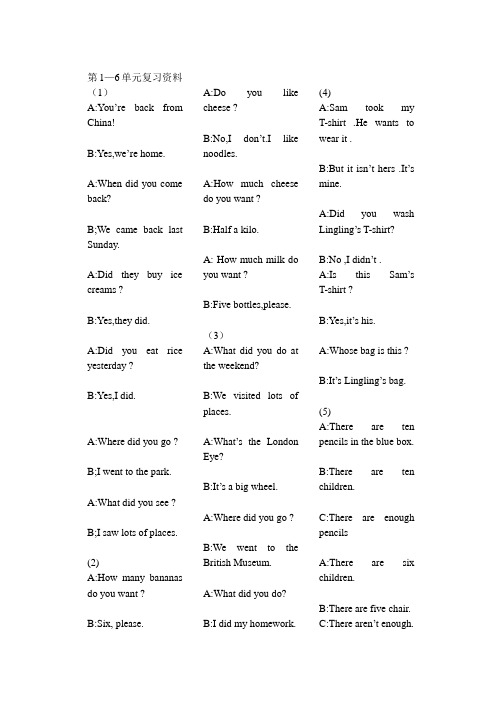
第1—6单元复习资料(1)A:You’re back from China!B:Yes,we’re home.A:When did you come back?B;We came back last Sunday.A:Did they buy ice creams ?B:Yes,they did.A:Did you eat rice yesterday ?B:Yes,I did.A:Where did you go ?B;I went to the park.A:What did you see ?B;I saw lots of places.(2)A:How many bananas do you want ?B:Six, please. A:Do you likecheese ?B:No,I don’t.I likenoodles.A:How much cheesedo you want ?B:Half a kilo.A: How much milk doyou want ?B:Five bottles,please.(3)A:What did you do atthe weekend?B:We visited lots ofplaces.A:What’s the LondonEye?B:It’s a big wheel.A:Where did you go ?B:We went to theBritish Museum.A:What did you do?B:I did my homework.(4)A:Sam took myT-shirt .He wants towear it .B:But it isn’t hers .It’smine.A:Did you washLingling’s T-shirt?B:No ,I didn’t .A:Is this Sam’sT-shirt ?B:Yes,it’s his.A:Whose bag is this ?B:It’s Lingling’s bag.(5)A:There are tenpencils in the blue box.B:There are tenchildren.C:There are enoughpencilsA:There are sixchildren.B:There are five chair.C:There aren’t enough.aretoomanybooks on the desk.are too manyapples in the bag.A:Are there enoughbooks ?B:Yes,thereare.(enough books)(6)A:Can you run fast ?B:No,I can’t.A:You can catch theball well.B:Yes,I can.can catch the ballwell .can play footballwell .A:Can you sing well ?B:I sing verybadly,sorry.A:She sells seashells atthe seashore .B:She can say it verywell.A:How well do youplay basketball ?B:I can’t play it .I’mnot tall .短语:Last SundayHurry upGo homeCome backLive inCome fromBy busIn the parkGo to the parkHad a lovely timeLot of placesWatch TVNeed foodHere you areGo to the supermarketAt the supermarketMake a listAt the weekendIt’s wonderful.Great WallTake photosTake a photoHigh upRound and roundBy planeOn the lineGive outIn the blue boxBe careful !Put ……onPut ……inOn the deskIn the bagBe in football teamRun fastControl the ballJump highBe good at……Be a good goalkeeperA fantastic goalkeeperDo best of allClimb upAny wall过去时态原形过去式Do didGo wentCome cameMeet metBuy boughtSee sawTake tookRead readAre wereIs wasGet gotWatch watchedWalk walkedWash washed。
外研社小学英语五年级下学期期末复习重点

期末复习重点第一模块一、重点单词:life生活 different不同的 ago以前 any任何,一些 television 电视机 field田地 us我们宾格grandchildren外孙子女 radio收音机 fire炉火 grandmother外祖母 lady女士,夫人telephone电话hope希望二、重点短语及知识点:in China在中国 many years ago许多年前enough food充足的食物 lots of许多 watch TV看电视have got 有,拥有every day每天four years ago四年前 a television programme一个电视节目last night昨晚 talk about讨论on athe fire在火上in the fields在地里 live过去式lived a smallbig house一栋小大房子come现在分词comingare过去式were were否定形式weren’tdid否定形式didn’t change现在分词chingingis过去式was bus复数buses三、重点句型:1. We lived in a small house.我们住在一间小房子里;2.It’s a programme about China.它是一个关于中国的节目;3. Life was very different in China many years ago.许多年前中国的生活完全不同;4. There are lots of buses and cars.有许多公交车和小汽车;5.We live in a big house.我们住在一间大房子里;6.Yesterday I watched TV with my grandchildren.昨天我和孙子们一起看电视了;7. Thank you for talking to us. 谢谢您和我们谈话;for后面的动词要加+ing形式8. She didn’t have a television .她那时候没有电视;9. I watched a televison programme about China last night.昨晚我看了一个关于中国的访谈节目;10. An old lady talked about her life many years ago.一个年老的女士谈论了她许多年前的生活;11.She couldn’t read or write. 她不能读也不能写;could或者couldn’t后面要加动词原形否定句里要用 or,不用and 12. A:How was it different 有什么不同B:There weren’t any buses.那时候没有公交车;情景连线否定句和疑问句中要使用any,不能使用some13.A:Where were you three days ago 三天前你在哪里B: I was in Qiu Jiagou.我在邱家沟;情景连线14.A:What did you do there 你在那里干什么疑问句中有一个did 表示过去式,所以后面的动词要用原形,例如本句中的 do B: I played with my friends.我和我的朋友玩;情景连线第二模块一、重点单词:learntlearn的过去式学习 these这些 dancer舞蹈演员class班级 study学习hard努力的 retired退休的二、重点短语及知识点:Chinese city中国城市 city复数citiesforeign languages外语 five years ago五年前by school bus乘校车walk to school步行去学校read a book读书make a cake做蛋糕dance过去式danced learn过去式learntlearn现在分词learning make过去式madeteach过去式taught study过去式studiedgo三单goes dance名词dancer三、重点句型:1.A: Why is she wearing these clothes 她为什么要穿这些衣服呢B: Because she was a dancer.因为她是个舞蹈演员;重点加情连2.She danced in lots of Chinese cities.她在中国许多城市跳过舞;3. A: Did your grandma learn English 你奶奶学过英语吗B: Yes,she did.\No,she didin’t.情景连线4. He is learning English now.他现在正在学习英语;now表示现在进行时,所以learn后面+ing5. Chen Hai is an English teacher.陈海是一位英语老师;English前面要用an6.Now he goes to school by school bus.他现在坐校车去上学;三单7. A:Who are they 他们是谁B:They’re my grandparents.他们是我的爷爷奶奶;情景连线8. A: Who’s this 这是谁B:It’s my grandma.这是我奶奶;情景连线9. A: Is this your grandpa 这是你爷爷吗B: Yes,it is.是的;情景连线10.A:What did she do yesterday 她昨天干什么了B: She made a cake.她做了个蛋糕;情景连线第三模块一、重点单词:egg鸡蛋 email电子邮件 sandwich三明治 traditional传统的 delicious 美味的,可口的 hamburger汉堡 ateeat的过去式吃 gavegive的过去式给 tonight在今夜,今晚drankdrink的过去式二、重点短语及知识点:an email一封邮件 English food英国食物 an English breakfast一顿英国早餐 at school在学校a traditional English dinner一顿传统的英国晚餐 Chinese food中国食物 last night昨晚have过去式had do过去式did sandwich复数 sandwiches do第三人称单数doessay三单says eat过去式ate does否定形式doesn’t give过去式gave buy过去式bought三、重点句型:1.A:What did she have for breakfast 她早餐吃的什么B:She had eggs and sausages.她吃的鸡蛋和香肠;情景连线 2.I have got an email from Lingling.我收到玲玲的邮件;3.Yesterday she had an English breakfast.昨天她吃了一顿英国早餐;4.A:Does Lingling like English food 玲玲喜欢英国食物吗B: Yes,she does.\No,she doesn’t.是的,她喜欢;\不,她不;情景连线 5. A:What did you have for breakfast yesterday 你昨天早晨吃的什么 B:I had eggs我吃的鸡蛋;情景连线6. Today Sam ate six hamburgers at school.今天山姆在学校吃了六个汉堡包;7.We gave our hamburgers to Sam.我们把我们的汉堡包给了山姆;8. Tonight Mum is going to cook Chinese food for Lingling.今晚妈妈打算给玲玲做中国食物;9. A:What did you eat\drink last night 昨晚你吃的\喝的什么 B: I ate\drank…我吃的\喝的…情景连线10.A:What are you going to eat\drink tonight 你今晚打算吃\喝什么 B:I’m going to eat\drink…我打算吃\喝…情景连线第四模块一、重点单词:library图书馆 find找到 CD-ROM电脑光盘 bring带来,拿来 newspaper报纸 use使用card卡片 easy简单的 information信息 timetable时间表,时刻表 dictionary字典二、重点短语及知识点:make an e-card做电子卡片 good at 擅长于 go to the library去图书馆on Shelf C在C书架上library card图书证 bring back带回来 in two week’s time两周内 find out 找出 Chinese word汉字 in the timetable在信息表里 in the dictionary在字典里 on the CD-ROM在光盘上at the zoo在动物园in the newspaper在报纸上 on the computer在电脑上 on TV在电视上 buy过去式bought三、重点句型:1.A:Where are the books about computers,please 请问电脑书在哪里 B:They are on Shelf C.在C书架上;情景连线2. I want to make an e-card for Mum.我想给妈妈做一张电子卡片; want后面加to,to后面则用动词原形make; e-card前要用an修饰,不用a. 3.Let’s go to the library.让我们去图书馆吧;let’s后面加动词原形4.We can find a book about e-cards there.在那里我们能找到关于电子卡片的书;5. A: Can I have your library card,please 我能看一下你的借书证吗 B: Yes.Here you are.是的,给你;情景连线6.Please bring back the book in two weeks’time.请两周内还书;7. Where can you find out about animals 你能从哪里找到关于动物的书8.You can find out about Chinese food/words on this CD-ROM/in the dict ionary. 你在这张光盘\字典里找到关于中国的食物\汉字;9. There is also a CD-ROM in it.里面有一张光盘;在…里面要用in 10. I’m not good at it.我不擅长;good at 固定短语,擅长于 11. Here is a card for you.这是给你的卡片;for “为了…;给… 12. It’s easy with a computer. 电脑很简单;with“用…”第五模块一、重点单词:light轻的 broken坏的,破的 heavy重的 pocket口袋,兜儿 hard困难的二、重点短语及知识点:look at看,看一看 thank you very much非常感谢 I will缩写形式 I’ll big反义词small heavy反义词light new反义词broken easy反义词hard can否定形式can’t she宾格her三、重点句型:1.This black bag is nice.这个黑色的包不错;2.You can’t take it to China.你不能把它带回中国;3.I’ll buy you a new one.我会给你买个新的;4.This blue one is big and light.这个蓝色的既大又轻;5.It’ll be easy for heryou.它会很合适她你;6. It’s got a panda on it.上面有个熊猫;7. A: Have you got a small one,please 你有小一点的吗B:Yes, I have.\No,I haven’t.是的,我有;\不,我没有;情景连线8.A: Is it round 它是圆的吗 B:Yes, it is.\No,it isn’t.是的,它是;\不,不是;情景连线第六模块一、重点单词:photo照片 stay停留 week星期,周 parent父亲,母亲 rode骑马 horse 马 climb攀登,爬 holiday假日二、重点短语及知识点:last year去年 in the west og在…西边 play football踢足球 in July在七月 every year每年ride a horse骑马 go swimming去游泳 go过去式went photo复数photos do过去式didstay过去式stayed live第三人称单数lives ride过去式rode is过去式was have过去式had east东 west西south南north北三、重点句型:1. It’sXinjiang in the west of China.它新疆在中国的西部;2. We stayed with my grandmother for a week in July.七月我们和奶奶呆了一个星期;3. He lives there with his tree children.他和他的三个孩子住在那里;4. A: When did you go to Xinjiang 你们什么时候去的新疆 B: We went there in July.我们七月去的;情景连线5. A:Did you go with your mother and father 你和你爸妈一起去的吗 B:Yes,I did.\No,I didn’t.是,是的;\不,没有;情景连线 6. A:Where did you go for your holiday 你假期去哪里了 B:I went to Yinchuan.我去了银川;情景连线7.A: Can I see them,Lingling 我能看看他们吗,玲玲B: Of course.当然;情景连线 8.A:Who is this 这是谁B: It’s my uncle.是我的叔叔;情景连线9.The mountains are really beautiful.这些山实在是太漂亮了;mountain后加s,所以用are第七模块一、重点单词:message信息 another另一个 idea主意,想法 office办公室 busy忙碌的二、重点短语及知识点:send an email发送电子邮件 a computer message一条电脑信息 a good idea一个好主意 click on 点击 write your message写你的信息 at the office在办公室on the blackboard在黑板上see you later一会见,回头见写电子邮件的顺序:Click on“Email”点击邮件------- Click on“Write”点击书写---- Write your message.书写电子邮件--- Click on“Send”点击发送三、重点句型:1. It goes from one computer to another computer.它从一台电脑到另一台电脑;2. Let’s send an email to Dad.让我们给爸爸发送邮件吧3. The message will go to Dad’s computer at work.这条信息会在爸爸的电脑工作室发过去;4. I’ve got an email from little Tom.我收到了小汤姆的邮件;5. I will be home at seven o’clock.我七点回家;6. I am working very hard at the office.我在办公室努力的工作;第八模块一、重点单词:suggest 建议 quickly快地,迅速地 excited激动的,兴奋的 America美国 Chinese中国人kind种类 dragon 龙 same相同的 circle圆,圆圈二、重点短语及知识点:come quickly快点来 in the summer在夏天 a good idea一个好主意 a Chinese in the sea在大海里dragon kite一个中国龙风筝….the same as…和….一样三、形容词的比较级:一般形容词的比较级是在这个单词的后面加-erlong---longer short---shorter big---bigger small—smaller thin---thinner fat---fatter young---younger old---older tall--taller四、重点句型:1. What do you suggest 你有什么建议2. Daming is on the phone for you.大明电话找你;3. I’m going to go to America in the summer.今夏天我要去美国了;4. I want to take a present for my cousinbrother.我想给我堂兄兄弟带件礼物;5. Why don’t you give him a kite 你为什么不给他一个风筝呢6. How about a dragon kite 龙风筝怎么样7. Is Line A the same as Line B 线段 A 和线段 B 一样长吗 8. Is Circle A the same as Circle B 圆圈A和圆圈B 一样大吗9. Why don’t you wear a beautiful dress 你为什么不穿一件漂亮的连衣裙呢 10. I’m going to go to a party.我打算去一个聚会;第九模块一、重点单词:wore穿 women女人 actor演员 told讲,告诉 joke笑话 funny滑稽的 after在……以后 show演出 ready准备好的 soon不久 bed 床 room房间 history历史 question问题 borrow借来 evening傍晚二、重点短语及知识点:a lot 许多 in English 用英语 last week上周 lots of许多 go to a restaurant去饭馆last night昨晚the London Eye伦敦眼 in three weeks三周里 in the room在房间里Chinese history中国历史 Chinese songs中国歌曲 in the evenings在晚上 get过去式got go过去式went wear过去式wore tell过去式told is 过去式was eat过去式ate buy过去式bought read过去式read三、重点句型:1. I’ve got two letters in English.我收到两封英语信;2. Are you ready for your trip to America 你准备好你的美国之旅了吗3. The men wore women’s clothes.男人们穿着女人的衣服;4. The actors told lots of jokes.演员们讲了许多笑话;5. We laughed a lot.我们欢笑不止;6. After the show we went to a restaurant.演出结束后我们去了饭馆; 8. We are going to see you in three weeks.再三周我们就见面了;9. Dad is going to put another bed in my room. 爸爸打算在我的房间里再放一张床; 10. Don’t forget to bring CDs of Chinese songs.不要忘了带中国歌曲的光盘; 11. We can listen to them in the evenings. 我们能在晚上听;12. Dad is going to ask you some questions.爸爸要问你一些问题;13. Dad read a book about Chinese history. 爸爸读了一本关于中国历史的书; 14. Mum bought new chopsticks for you. 妈妈给你买了新筷子;第十模块一、重点单词:list目录,清单 airport机场 shoe鞋 ticket票 toothbrush牙刷 arrive 到达 taxi出租车 flat公寓 building建筑物 mademake过去式做 again再一次二、重点短语及知识点:in New York在纽约 a good idea好主意 go to the airport去机场 at the airport在机场 lots of许多 Chinese food中国食物 find out了解三、重点句型:1.A:Where are you going to go 你打算去哪里 B: To the airport.去机场;情景连线2. I’m going to meet you in New York.我回去纽约接你;3. Make a list of things to do.把你做的事情列一张清单;4.A: What are you going to take B: I’m going to take…情景连线5.A:When are you going to go to the airport 你打算什么时候去机场 B: I’m going to go to the airport at seven o’clock.我七点去机场;情景连线6.A:Who is going to go the airport 谁要去机场 B: It’s me.是我情景连线7. We went in a yellow taxi to their flat.我们坐一辆黄色的出租车去了他们的公寓;8.There are lots of tall buildings and lots of cars and people.有许多高楼大厦,车水马龙; 9. Grandma made Chinese food for you.奶奶给你做了中国食物; 10. But I want to try American food.但是我想试试美国食物; 11. It will be all right.没事的;注意be12. Everyone speaks English.每个人都说英语;注意speak后面要加s。
外研版小学英语五年级各单元知识点全汇总
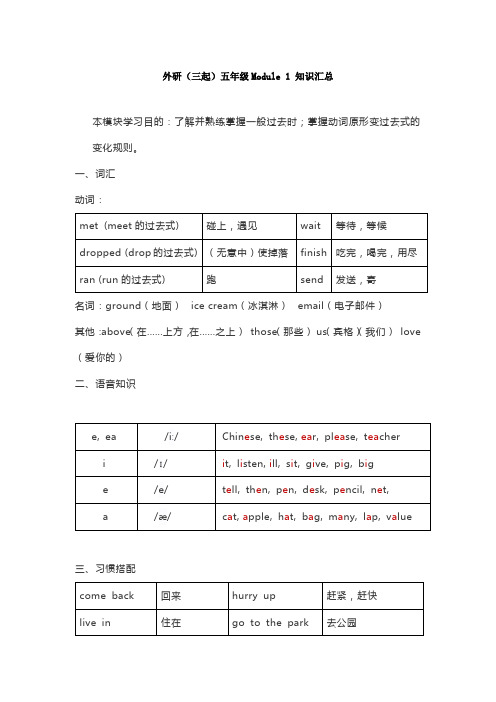
外研(三起)五年级Module 1 知识汇总本模块学习目的:了解并熟练掌握一般过去时;掌握动词原形变过去式的变化规则。
五、重点句型1. 询问对方过去是否做过某事:-- Did you + 动词原形+ 其他?-- Yes, I / we did. / No, I / we didn’t. eg: 1. -- Did you go to school yesterday?-- Yes, I did.2. -- Did you see a film last night?-- No, we didn’t.2. 描述某人过去做过某事:主语+ 动词过去式+ 其他.eg: 1. I met my English teacher yesterday.2. Bob lost his pet dog last Friday.外研(三起)五年级Module 2 知识汇总四、常用表达五、重点句型1. 如何询问物品的数量:①How much + 不可数名词+ do you have?②How many + 可数名词复数+ do you have?2. 一般过去时的特殊疑问句句型:-特殊疑问词+ did + 主语+ 动词原形+ 其他?-主语+ 动词的过去式+ 其他.eg: 1. -What did you do last Friday?-I did my homework.2. -How much milk did you buy?-I bought a bottle of milk.外研(三起)五年级Module 3 知识汇总一、词汇1. weekend 周末2.place 地方3. British 英国的,英国人的;英国人4. museum 博物馆5. how 如果,怎样6. best 最7. took(t ake的过去式)搭乘,乘坐(交通工具);需要花费(一定时间)四、重点句型1. –Where did you go? –I / We went (t o)+地点.eg: –Where did you go? –We went to the British Museum.2. 某人 + took a photo of + 他人.eg: Daming took a photo of his father.外研(三起)五年级Module 4 知识汇总四、惯用表达1. Don’t argue! 不要争吵!2. What’s the matter? 怎么啦?3. I’m so sorry. 我很抱歉。
外研社五年级上册英语语法点(精华版)

外研社五年级上册语法点1.those ice creams那些冰淇淋these places 这些地方buy an ice cream买一个冰淇淋need six bananas需要六根香蕉buy four pears 买四个梨2.Let’s = let us 让我们Let’s(=Let us)go to bed. 让我们上床睡觉吧。
3.(1)look at ...看...(强调看的动作)Look at me. 看我。
Look at the dog. 看这只狗。
(2)see看见(强调看的结果)I see a dog. 我看见了一只狗。
(3)watch观看I watched TV 我昨晚看了电视。
4.wait for sb 等待某人wait for me 等着我注意:for+人称代词宾格介词+人称代词宾格,for是介词!小学常见介词:at , of , for , with , to ...5.the H uangpu R iver 黄浦江the British Museum 大英博物馆the L ondon E ye 伦敦眼the G reat W allB ig B en 大本钟I went to the H uangpu R iver last year. 去年我去了黄浦江。
I visited B ig B en last year. 去年我参观了大本钟。
6.How many + 可数名词复数多少...How much + 不可数名词多少...How much... ...多少钱?例如:How many caps / ice creams?多少顶帽子/多少个冰激凌?How much juice / chocolate / milk?多少果汁/多少巧克力/多少牛奶?---How much is it? 它多少钱?---It’s five yuan. 它五元。
--How much milk did you buy? 你买了多少牛奶?---Six bottles. 六瓶。
外研版(一起) 小学英语五年级复习提纲

外研(一起)五年级Module 1 知识汇总一、词汇bench(长凳) playground(操场,运动场) for(达,计)different(不同的) then(那么,就)二、习惯搭配三、重点句型:1. 描述某处有某人/某物的句型:There is + 可数名词单数/不可数名词+ 其他.There are + 可数名词复数+ 其他.eg: 1. There is a bird on the tree.2. There are some books in the schoolbag.2. 描述某处以前没有某物的句型:There wasn’t + 可数名词单数/不可数名词+ 其他+ before. There weren’t + 可数名词复数+ 其他+ before.eg: 1. There wasn’t a river here before.2. There weren’t any benches in this park before.外研(一起)五年级Module 2 知识汇总一、词汇heavy(重的) let(允许,让) sell(卖,销售) sometimes(有时)二、习惯搭配三、常用表达:四、重点句型:描述物品的特征:The / This / That + 物品名称+ is + 形容词.eg: 1. This supermarket is big.2. That apple is red.外研(一起)五年级Module 3 知识汇总一、词汇名词:Halloween(万圣节前夕)Easter(复活节)festival(节日)mask(面具)neighbour(邻居)night(夜晚,夜间)chick(小鸡)chocolate(巧克力)其他:give(给,送) scary(吓人的,可怕的)二、习惯搭配三、惯用表达:四、重点句型:1. 介绍“今天是某个节日”的句型:T oday is +节日.eg: T oday is Christmas.2. 描述“某个节日在什么季节”的句型:节日+ is in +季节.eg: Halloween is in winter.外研(一起)五年级Module 4 知识汇总一、单词1. stories (s tory的复数形式)故事2. invitation 请帖3. November 十一月4. from (表示时间)从……起5. to 直到6. reply 回答,回复二、习惯搭配1. tidy up 收拾,整理2. my birthday party 我的生日聚会3. have lunch 吃午餐4. have a birthday cake 吃生日蛋糕5. after lunch 午餐后6. in the river 在河里7. see a film 看电影 8. tell stories 讲故事9. at the weekend 在周末10. on Saturday 在星期六11. make a birthday cake 做一个生日蛋糕三、惯用表达1. Oh yes! 哦,好的!四、重点句型1. We are going to + 动词原形(+其他).eg: We’re going to have lunch together. 我们打算一起吃午餐。
新版外研版五年级下册英语复习要点
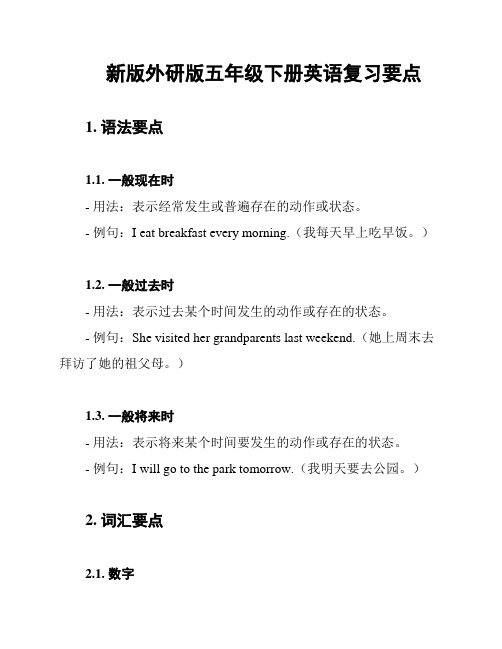
新版外研版五年级下册英语复习要点1. 语法要点1.1. 一般现在时- 用法:表示经常发生或普遍存在的动作或状态。
- 例句:I eat breakfast every morning.(我每天早上吃早饭。
)1.2. 一般过去时- 用法:表示过去某个时间发生的动作或存在的状态。
- 例句:She visited her grandparents last weekend.(她上周末去拜访了她的祖父母。
)1.3. 一般将来时- 用法:表示将来某个时间要发生的动作或存在的状态。
- 例句:I will go to the park tomorrow.(我明天要去公园。
)2. 词汇要点2.1. 数字- 读法:one, two, three, four, five, six, seven, eight, nine, ten, eleven, twelve, thirteen, fourteen, fifteen, sixteen, seventeen, eighteen, nineteen, twenty, thirty, forty, fifty, sixty, seventy, eighty, ninety, one hundred.- 用法:可以用于数数、表示年龄、时间等。
2.2. 家庭成员- 词汇:father, mother, brother, sister, grandfather, grandmother.- 用法:用于描述家庭成员关系。
3. 句型要点3.1. 简单陈述句- 结构:主语 + 谓语 + 宾语。
- 例句:She likes apples.(她喜欢苹果。
)3.2. 疑问句- 结构:疑问词 + 助动词 + 主语 + 谓语 + 其他?- 例句:Where do you live?(你住在哪里?)3.3. 祈使句- 结构:动词原形 + 其他。
- 例句:Open the door.(打开门。
)以上是新版外研版五年级下册英语复习的要点。
主要句型复习资料(知识清单)外研(一起)英语五年级下册
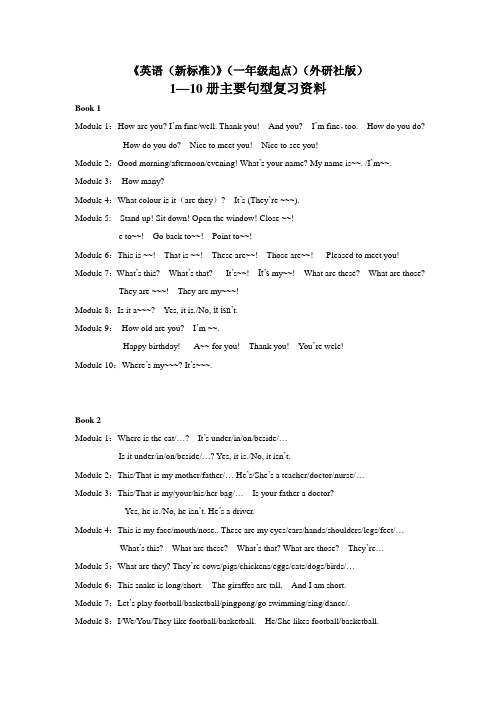
《英语(新标准)》(一年级起点)(外研社版)1—10册主要句型复习资料Book 1Module 1:How are you? I’m fine/well. Thank you! And you? I’m fine,too. How do you do?How do you do? Nice to meet you! Nice to see you!Module 2:Good morning/afternoon/evening! What’s your name? My name is~~. /I’m~~. Module 3:How many?Module 4:What colour is it(are they)? It’s (They’re ~~~).Module 5: Stand up! Sit down! Open the window! Close ~~!e to~~! Go back to~~! Point to~~!Module 6:This is ~~! That is ~~! These are~~! Those are~~! Pleased to meet you! Module 7:What’s this? What’s that? It’s~~! It’s my~~! What are these? What are those?They are ~~~! They are my~~~!Module 8:Is it a~~~? Yes, it is./No, it isn’t.Module 9:How old are you? I’m ~~.Happy birthday! A~~ for you! Thank you! You’re wele!Module 10:Where’s my~~~? It’s~~~.Book 2Module 1:Where is the cat/…? It’s under/in/on/beside/…Is it under/in/on/beside/…? Yes, it is./No, it isn’t.Module 2:This/That is my mother/father/… He’s/She’s a teacher/doctor/nurse/…Module 3:This/That is my/your/his/her bag/…Is your father a doctor?Yes, he is./No, he isn’t. He’s a driver.Module 4:This is my face/mouth/nose.. These are my eyes/ears/hands/shoulders/legs/feet/…What’s this? What are these? What’s that? What are those? They’re…Module 5:What are they? They’re cows/pigs/chickens/eggs/cats/dogs/birds/…Module 6:This snake is long/short. The giraffes are tall. And I am short.Module 7:Let’s play football/basketball/pingpong/go swimming/sing/dance/.Module 8:I/We/You/They like football/basketball. He/She likes football/basketball.What’s your/his/her favourite colour/…? It’s …What about yours/his/hers/ours/theirs…? It’s…Module 9:Noodles/Rice/… for you/me/him/her/us. I don’t like noodles/… I like…Module 10:Here’s a present for you/me/him/her/us. Do you like dolls? Yes, I do./No, I don’t.Book 3Module 1:This is my favourite song . It’s the Alphabet song.What do you like? Do you like …?Module 2:Amy likes Tshirts. She doesn’t like these trousers.Module 3:We have English/Chinese/Maths/Music/Art/PE in the morning/afternoon/evening.He/She has English/Chinese/Maths/Music/Art /PE in the morning /afternoon…Module 4:What’s the time? Is it …o’clock?(The film) is at …o’cl ock.Module 5:I … ( get up /…) at … ( … o’ clock / … ) It’s late.Module 6:Have a good weekend. Do you … (play football) at the weekend? How about …?She / He … (reads books) at the weekend. Does she / he …?Module 7:What do you do at the weekend? Where do you live? Is it a big city?What school do you go to?Module 8:How do you go to …?I go to … by …How does your … go to …?She / He go to … by …? Do you go by …?Module 9:It’s … (spring) we wear … We don’t wear …I like …. Because it’s …Module 10:What are these? What do you do at Chinese New Year?Book 4Module 1:What is the weather like? It is raining/windy/sunny now.Is it windy/sunny/raining? Yes, it is. No, it isn’t. I like swimming/skiing.Module 2:What is she/he doing? She/He is singing.What are you/they/we doing? You/They/We are singing.Module 3:Sam isn’t tidy his room. Is she/he doing his homework? Yes, she/he is.No, she/he isn’t. Are they watching TV? Yes, they are. No, they aren’t.Are you reading a book? Yes, I am. NO, I am not.Module 4:What are they doing? They are listening to music. What are you doing? I am talkingto you. Where is Lingling? What is he/she doing? He/She is playing with toys.We are very late. Hurry up! Please put on your shoes. There is no time to lose. Module 5:Lingling is skipping. Do you like clapping games? Yes, I do. No, I don’t.Don’t be late. What are you playing? We are playing catch.Module 6:He usually rides his bike. But he isn’t riding it today.I usually do my homework. But I am not doing my homework today.Module 7:It is Children’s Day today. We are having a picnic.Module 8:Where is the train going? It is going up a hill.Module 9:Turn left/right. Go straight on. Where do you live? I live in ….Module 10:Where is the zoo? It is next to the park.Book5Module 1:Do you want~~~? Do you use~~~? Yes, I do. /No, I don’t. We use~~~.Module 2:What are you doing? We’re ~~~. Please be quiet!Module 3:What are these? What are those? They’re~~. This is~~. That is~~. These are~~.Those are~~.Module 4:Can you~? Yes, I can. /No, I can’t. I can~. I can’t~.Module 5:Can I ~? Yes, you can. / No, you can’t. Can you~? Yes, I can. / No, I can’t. Module 6:I’ve got a ~. You’ve got a …He’s got a ~. She’s got a ~. It’s got a ~.Module 7:Have you got a ~? Yes, I have. /No, I haven’t.Has he/she got ~? Yes, he/she has. No, he/she hasn’t.Module 8:There is ~. There are~. How many~~ are there? There are ~. / There is~. Module 9:I’m going to~. He / She is going to~. What are you going to be?I’m going to be~. He/ She is going to be~.Module 10:Where are you going? I’m going to~. What are you going to do? I’m going to~.Are you going to~? Yes, I am. / No, I’m not. What are they going to do? They’regoing to~.Book 6Module 1:What is he/she like? He/She is nice.Module 2:It is very long/big/small/high…Module3:What will you do this weekend? We’ll see lions, tigers and pandas.Module 4:What will you be in the future? I will be a ….Module 5:We’ll pick fruit. Will we pick oranges? Yes, we will. No, we won’t.How many peaches are there? There are….Module 6:Is Fangfang naughty? Yes, she is. No, she isn’t.Module 7:You/They were very young. My hair wasn't long then.Module 8:Where was the fruit? It was on the first floor.Was he/she there? Yes, he/she was. NO, he/she wasn’t.Module 9:Will you take your ball tomorrow? Yes, I will. No, I won’t.He will sleep on Sunday. What will they do? They will….Module 10:How many children are there in your class? There are fifty.What’s sixty plus forty? It’s one hundred.Book 7Module 1:I’m form China.Sam is from England. They are from America.What’s he doing? He is dancing. Where do you live? I live in China.Where does he live? He lives in London.I like (doing) something e.g. I like watching TV. Sam likes bananas.Module 2:Lingling didn’t get up at half past six yesterday. Daming usually walks to school. Module 3:Do you collect stamps?–Yes, I do. /No, I don’t. Does he collect stamps? –Yes, he does./No, he doesn’t. Have you get any stamps from China? –Yes, I have. /No, I haven’t.Has he/she got any…? Yes, he/she does. /No, he/she doesn’t.These are some stamps from Canada. This stamp is from China.Module 4:Chinese people invented paper. Chinese people didn’t invent the bicycle.An English man invented the bicycle in 1839.Module 5:It’s a picture of the Great Wall. We saw lots of mountains.Module 6:He made a cake. He didn’t make biscuits.Did you see a duck? No, I didn’t. / Yes, I did.Module 7:Did Tom fall over? No, he didn’t. I saw a monster on the TV.Module 8:When did they e? They came last week. What did she play?She played the flute. Where did you go? I went to the zoo.Module 9:What happened to you? I fell over. And I hurt my knee.Module 10:What’s the matter? I’ve got a stomach ache. How many biscuits did you eat?Book 8Module 1:Don’t touch the machines, please! Wear these glasses, please.And don’t touch anything!Module 2:This puter is beautiful/expensive/big/powerful/…. It’s purple/…It’s small.And it’s cheap/…This TV costs 2,000 yuan.Module 3:There was a boy. He looked after sheep. The boy ran to the village.They said, “Don’t tell lies.”Module 4:What did they play? Dad played the erhu/violin/guitar/….And Mum played the pipa/piano.What did you/she/he/they play? I/She/He/They played… Where did Daming go?When did he go there? How did he go there? What did he do there?Module 5:What are you doing? We’re/I’m having a party.What’s happening now? Tom is singing/…Module 6:I’ll draw the pictures/write the reports.What will you do, Sam? I will cut the paper. Let’s…Module 7:This planet is near to the sun. This planet is far from the sun. It’s very hot/cold. Module 8:He lives in the east of America. Do you live in …? Yes, I do. /No, I don’t.Does he live in Washington? Yes, he does. /No, he doesn’t.Los Angeles is in the west of America.Canada is to the north of America. Mexico is to the south of America.Module 9:Why do you like Australia? Because I love Australian animals.Kangaroos live in Australia. Fish live in the river and birds live in the tree. Module 10:What are you/they going to do this summer?I’m/we’re/They’re going to go back to England.What is he/she going to do this summer?He’s/She’s going to … I’ll/We’ll send you a postcard from England.Book 9Module 1:There was a slide. There weren’t any swings here before.There are some ducks in the pond.Module 2:What a big supermarket! There are many sweets. These bags are heavy.This monkey is thin. What do you want? I want a …Module 3:The people give them sweets. They go to people’s houses.Module4: What are you going to do at the party? I am going to sing songs.He/She/Sam is going to take photos. We/They/You/Sam and Amy are going t…. Module 5:Whose Tshirt is it? It’s mine.Module 6:Can you run fast? Yes, I can. /No, I can’t.Module 7:Can Fifi help the blind people? No, he can’t.Module 8:The children sit around tables in England. We sit in lines in China.They sing songs every morning. We do morning exercises.They start school at 9 o’clock. In China, school starts at 8 o’clock.What time do you get up? What time does your school start?What time does it finish? What do you do at break time?What’s your favourite subject? What time do you go to bed?Module 9:Are you sad? No, I am not. What are you thinking about?What’s the matter? Nothing. Do you want to play…? Yes, I do. No, I don’t. Module 10:You shouldn’t make a mess. You should wash your hands.Book 10Module 1:What was he/she before? What is he/she now?What did he/she do (teach / drive / play …)? What does he/she do?Where did your grandma work? Where do your parents work?Where does your mother work?Module 2:What did you / he / they have for breakfast/lunch/dinner ?What do you / they have for …? What does he /she have for …?What time do you have …? What time does he /she have …?Module 3:Have you got …?Yes, I have./ No, I haven’t. You can / can’t …?Module 4:Did you read your books last week? Yes, I did./No, I don’t.My favourite … is …(s). What did you do in spring / …?When is your birthday? Is it in …?Module 5:This black bag is big. I carry my back on / over / with … (back / shoulder/ hand).I see /… with my eyes /….Module 6:What will you do … (this summer)? What will you see/ … (drink /…)?How will you get there? What did you do … (last summer)? What did you see/…? Module 7:How to make a kite?First, Then, At last,He is at the office now. He will be home at …o’clock.Module 8:Will you … tomorrow? What are you going to do … (tomorrow)?Module 9:What did you do … (last night)? Yesterday, he ate a hamburger.Now, he is playing the flute. Tomorrow, he is going to do homework.Module 10:Where did you go … (last year)? Where will you go … (this year)?When did you go there? When will you to there? What did you do there?What will you do there?Who did you meet there? Who will you meet there?How did you get there? How did you get there?。
外研社英语五年级上册一年级起点
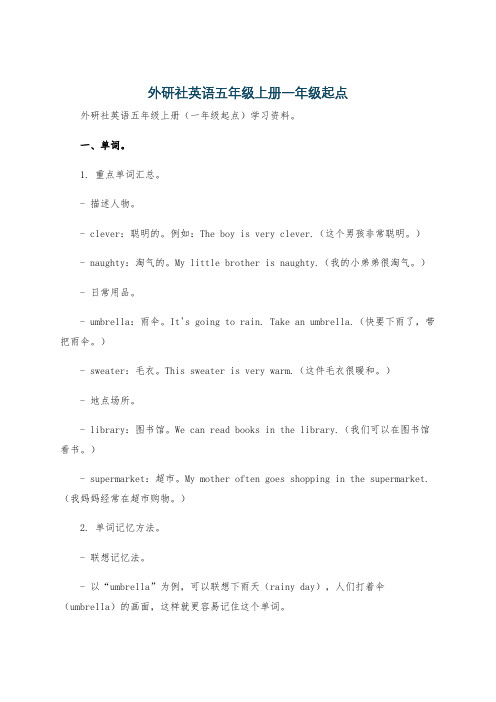
外研社英语五年级上册一年级起点外研社英语五年级上册(一年级起点)学习资料。
一、单词。
1. 重点单词汇总。
- 描述人物。
- clever:聪明的。
例如:The boy is very clever.(这个男孩非常聪明。
)- naughty:淘气的。
My little brother is naughty.(我的小弟弟很淘气。
)- 日常用品。
- umbrella:雨伞。
It's going to rain. Take an umbrella.(快要下雨了,带把雨伞。
)- sweater:毛衣。
This sweater is very warm.(这件毛衣很暖和。
)- 地点场所。
- library:图书馆。
We can read books in the library.(我们可以在图书馆看书。
)- supermarket:超市。
My mother often goes shopping in the supermarket.(我妈妈经常在超市购物。
)2. 单词记忆方法。
- 联想记忆法。
- 以“umbrella”为例,可以联想下雨天(rainy day),人们打着伞(umbrella)的画面,这样就更容易记住这个单词。
- 分类记忆法。
- 把单词按照人物、日常用品、地点等类别分类记忆。
如在记忆描述人物的单词时,一起记忆“clever”“naughty”等单词,通过对比它们的含义来加深记忆。
二、句型。
1. 重点句型。
- There be句型。
- There is a book on the desk.(桌子上有一本书。
)- There are some apples in the basket.(篮子里有一些苹果。
)- 一般现在时的特殊疑问句。
- What do you do on Sundays?(你在周日做什么?)- Where does your father work?(你爸爸在哪里工作?)2. 句型练习。
外研社五年级知识点英语
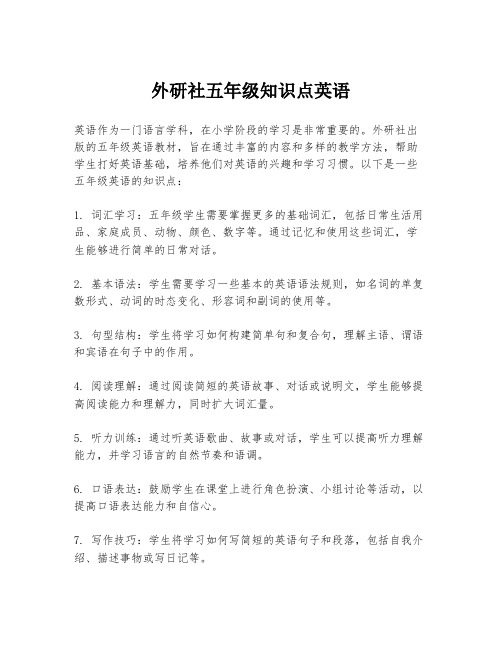
外研社五年级知识点英语英语作为一门语言学科,在小学阶段的学习是非常重要的。
外研社出版的五年级英语教材,旨在通过丰富的内容和多样的教学方法,帮助学生打好英语基础,培养他们对英语的兴趣和学习习惯。
以下是一些五年级英语的知识点:1. 词汇学习:五年级学生需要掌握更多的基础词汇,包括日常生活用品、家庭成员、动物、颜色、数字等。
通过记忆和使用这些词汇,学生能够进行简单的日常对话。
2. 基本语法:学生需要学习一些基本的英语语法规则,如名词的单复数形式、动词的时态变化、形容词和副词的使用等。
3. 句型结构:学生将学习如何构建简单句和复合句,理解主语、谓语和宾语在句子中的作用。
4. 阅读理解:通过阅读简短的英语故事、对话或说明文,学生能够提高阅读能力和理解力,同时扩大词汇量。
5. 听力训练:通过听英语歌曲、故事或对话,学生可以提高听力理解能力,并学习语言的自然节奏和语调。
6. 口语表达:鼓励学生在课堂上进行角色扮演、小组讨论等活动,以提高口语表达能力和自信心。
7. 写作技巧:学生将学习如何写简短的英语句子和段落,包括自我介绍、描述事物或写日记等。
8. 文化意识:通过学习英语,学生可以了解英语国家的文化和习俗,增强跨文化交流的能力。
9. 学习策略:教师应教授学生有效的学习策略,如如何使用词典、做笔记、复习等,以提高学习效率。
10. 情感态度:培养学生对英语学习的积极态度,鼓励他们在遇到困难时不放弃,享受学习过程。
结尾:五年级是英语学习的关键时期,通过掌握这些知识点,学生将为未来的英语学习打下坚实的基础。
教师和家长的鼓励与支持对学生建立自信和持续学习至关重要。
希望每位学生都能在英语学习的旅程中取得进步和成功。
外研社英语五年级知识点

外研社英语五年级知识点外研社英语五年级的课程内容涵盖了多个方面,包括词汇、语法、句型结构、阅读理解和口语表达等。
以下是一些关键的知识点:1. 词汇学习:- 学习与日常生活相关的词汇,如家庭成员、学校物品、食物、动物、颜色、数字等。
- 掌握一些动词的过去式和现在分词形式,如play-played-playing, go-went-going等。
2. 语法要点:- 学习一般现在时、一般过去时和一般将来时的用法。
- 掌握名词复数、动词时态、形容词比较级和最高级的变化规则。
- 理解并使用疑问句,包括一般疑问句和特殊疑问句。
3. 句型结构:- 学习并运用简单句、并列句和复合句。
- 掌握使用连词(如and, but, or, because, so等)连接句子。
4. 阅读理解:- 阅读简短的故事、对话和说明文,理解文章的主旨和细节。
- 学习如何从文中提取信息,回答相关问题。
5. 口语表达:- 练习日常对话,包括问候、自我介绍、询问和回答简单的问题。
- 学习描述人和物,表达喜好和不喜欢。
6. 写作技巧:- 练习写简单的句子和段落,如写日记、描述图片或写信。
- 学习如何组织思想,使用合适的连接词。
7. 文化知识:- 了解一些英语国家的文化习俗,如节日、饮食习惯等。
8. 学习策略:- 学习如何使用词典,查找生词的意思。
- 学习如何通过上下文猜测生词的意思。
结尾:五年级的英语学习是一个重要的阶段,它为学生打下了坚实的基础,使他们能够更自信地使用英语进行交流。
通过系统的学习和实践,学生们将能够更好地理解英语,提高语言运用能力。
希望这些知识点能够帮助学生在英语学习的道路上更进一步。
五上英语外研版第一二单元重点知识

以下是五年级上册英语外研版第一、二单元的重点知识总结第一单元:我的新老师一、词汇科目词汇:1.Chinese 语文2.Maths 数学3.English 英语4.Science 科学5.PE 体育6.Music 音乐7.Art 美术描述词汇:1.strict 严格的2.kind 和蔼的/亲切的3.funny 有趣的4.clever 聪明的5.shy 害羞的6.句子中的其他词汇:7.sometimes 有时8.cool 酷的9.speak 说/讲(某种语言)10.h elp 帮助11.f inish 完成/做好12.p hone 打电话/电话13.a t 在......(点钟)14.w ho’s = who is 是谁二、句型1.询问某科的老师是谁:2.Who’s your [subject] teacher?3.你的[某科目]老师是谁?4.描述老师的特点:5.[Name] is our [subject] teacher. [He/She] is [adjective].6.[名字]是我们的[某科目]老师。
他/她是[形容词]。
7.询问某人是否懂某种语言:8.Does [he/she] speak [language]?9.他/她说[某种语言]吗?10.询问某人的喜好:11.W hat’s [he/she] like?12.他/她怎么样?13.表达某人有时做某事:14.[He/She] sometimes [action].15.他/她有时[做某事]。
16.询问某人是否完成某事:17.D o you finish your homework?18.你完成作业了吗?19.表达某人正在帮助某人做某事:20.[Name] is helping [other name] [action].21.[名字]正在帮助[另一个人名字][做某事]。
22.打电话的用语:23.T his is [name] speaking. 我是[名字]。
(完整word版)外研版五年级的英语重点句型和短语复习资料.docx
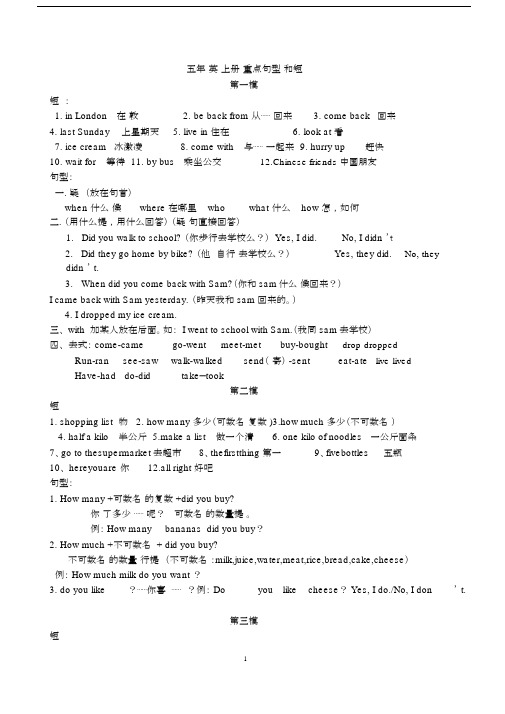
4. You can play footballwell。(你能踢足球踢得很好。)
第七模
短
1.a TV show about关于⋯⋯的 目2.be useful有用的3.sit down坐下
4.hot dogs狗5.these firefighter些消防6.sausage香 句型
they
their
them
we
our
us
二. 短
1. What’s the matter?生什么事了?2. on the line
在 上
3、Don't argue不要争吵
三. 法点
1. Whose bag is this?
是 的 包?Whose: 的,后面直接跟名 , 的 西。
2.lingling’玲scap玲的帽子。 人名 ’s名+ :名 所有格,表示是 的 西。
4、She didn’havet a television or a radio.她没有一台 机和一台收音机。
(or和and都可以“和 ”的意思,or用在否定句中,and用在肯定句中。)
Module 2
五年 英 上册 重点句型 和短
第一模
短 :
1. in London在 敦2. be back from从⋯⋯ 回来3. come back回来
4. last Sunday上星期天5. live in住在6. look at看
7. ice cream冰激凌8. come with与⋯⋯ 一起来9. hurry up赶快
can’表t示不能干某事。
1.This man is blind. He can’tsee. This dog helps him.
外研版小学英语五年级上册复习资料

外研版小学英语五年级上册复习资料一、单词分类1 职业(jobs)舞蹈演员dancer 司机driver 教师teacher 学生student 医生doctor 护士nurse 农民farmer 歌唱家singer 作家writer 男演员actor 女演员actress 电视台记者TV reporter (男)警察policeman 清洁工cleaner 售货员assistant (女)警察policewoman 画家artist2人体(body)foot脚 head头face脸hair头发nose鼻子 mouth嘴eye眼睛 ear耳朵 arm手臂 hand手 finger手指 leg腿 tail尾巴3乐器(Musical Instruments)violin小提琴piano 钢琴 flute 笛子 drum鼓 zither 古筝 erhu 二胡 guitar吉他4衣服(clothes)jacket夹克衫 shirt衬衫 T-shirt丅恤衫skirt短裙子 dress连衣裙jeans牛仔裤 pants长裤 socks袜子 shoes鞋子 sweater毛衣coat上衣raincoat雨衣 shorts短裤 sneakers网球鞋 slippers拖鞋 sandals凉鞋boots靴子 hat(有沿的)帽子cap便帽 sunglasses太阳镜tie领带 scarf围巾 gloves手套trousers裤子 cloth布5国家(countries)China/PRC中国America/USA美国 UK联合王国 England英国Canada/CAN加拿大 Australia澳大利亚Japan 日本 France法国 Germany德国6运动(sports)race 赛跑high jump跳高long jump跳远walk竞走swim游泳judo 柔道skiing 滑雪skating 滑冰boxing拳击basketball篮球volleyball排球badminton羽毛球 tennis网球 table tennis 乒乓球 baseball棒球wrestling摔跤soccer 足球 chess象棋7三餐(three meals)早餐breakfast 午餐lunch 晚餐 (supper)dinner8地方(places)home家classroom教室school学校 park公园library图书馆zoo动物园post office邮局garden花园 study书房playground操场 bookstore书店 farm农场police office警察局 hospital医院 cinema电影院9食品、饮料(food & drink)rice米饭bread面包 beef牛肉milk牛奶water水chicken鸡肉 biscuit饼干 soup汤fish鱼 tofu豆腐cake蛋糕 cookie曲奇pork猪肉 tea茶jam果酱 noodles面条 meat肉salad沙拉 Coke可乐 ice-cream冰淇淋juice果汁 coffee咖啡 hot dog热狗hamburger汉堡包vegetable蔬菜fish and chips 鱼和薯片 egg蛋10颜色(colours)红red 蓝blue 黄yellow 绿green 白white 黑black 粉红pink紫purple 橙orange 棕brown 灰grey11月份(months)January (Jan.)一月份 February(Feb.) 二月份 March(Mar.) 三月份 April 四月份May五月份 June六月份 July七月份 Auguest(Aug.)八月份 Septemper(Sept.) 九月份October(Oct.) 十月份 November(Nov.)十一月December(Dec.) 十二月12星期( week )星期一Monday 星期二Tuesday 星期三Wednesday 星期四Thursday星期五Friday 星期六Saturday 星期日Sunday 周末weekend13季节( seasons ) 春spring 夏summer 秋autumn (fall) 冬winter14 thing to do every day (每天做的事情)Get up 起床 go to school 去学校 do my homework 做家庭作业have breakfast 吃早餐 Have lunch 吃中餐 have dinner 吃晚餐do housework做家务 wash clothes 洗衣服 running跑步read my book 读书 play football踢足球 play basketball 打篮球watch TV看电视 go to bed 睡觉 listen to the music 听音乐help my mother 帮妈妈做家务 water the flowers浇花 Swimming 游泳15玩具(toy)Car 小汽车 train火车 plane飞机 doll 洋娃娃 bear 小熊 ball球balloon气球kite风筝jigsaw puzzle拼图游戏box盒子yo-yo溜溜球16学校课程(school subjects)science科学Moral Education 思想品德课Social Studies社会课Chinese语文 math数学 PE体育课English英语课 Art美术 Music 音乐17动物(animals)猫cat 狗dog 猪pig 鸭duck 兔rabbit 马horse 大象elephant 蚂蚁ant 鱼fish 鸟bird 鹰eagle 鹿deer 蛇snake 老鼠mouse熊bear 袋鼠kangaroo 猴monkey 熊猫panda 狮子lion 老虎tiger狐狸fox 斑马zebra 长颈鹿giraffe 鹅goose 母鸡hen 火鸡turkay小羊lamb 绵羊sheep 山羊goat 奶牛cow 驴donkey18.方位词:东east 西west 南south 北north19.常见的时间词:昨天yesterday, 今天today ,明天tommorow, 现在now, 上周last week, 上个月last month, 去年last years,今早this morning ,今晚tonight , 今年this year, 这周this week, 在周末at the weekend, 许多年前 many years ago,三年前 three years ago, 五天前five days ago , 两周前two weeks ago, 晚饭后after dinner20.疑问词:what(什么) what colour(什么颜色) what time(几点) what day(星期几)what about(怎样) how about (怎样) how(怎样) how old(年龄多大,几岁) how many(多少) how much (多少钱) who(谁) when(什么时候) whose (谁的) where(在哪里) why(为什么) which(哪一个)21.be动词am /is/ are/ was/ were22.助动词do does did23.情态动词 can/could能会 should应该 will将要二、动词的过去式不规则形式:am/is---was是 are---were是 arrive---arrived到达buy---bought 买 bring---brought带来 borrow---borrowed借出climb---climbed 攀爬 do/does---did做don’t /doesn’t ---didn’t 不 draw---drew画画 drink---drank 喝eat---ate 吃 fly---flew 放飞 find---found找到fall---fell 跌落 feel---felt 感受 forget---forgot 忘记give--- gave给 get---got 得到 have/has--- had 吃live---lived 居住 learn---learnt学习lose --- lost丢失make--- made 制作 put---put放 read---read读书ride---rode 骑(自行车) run---ran 跑 send---sent发送,寄say---said 说 sit---sat 坐 stand---stood 站•swim---swam 游泳sweep--- swept清扫 speak --- spoke 说(某种语言)talk---talked谈话 take---took 带走 teach--- taught教(书)tell---told 告诉 travel--- traveled旅行 wear--- wore穿戴write---wrote写 wear---wore穿 study---studied学习hope---hoped希望 use---used使用 stay---stayed 停留show---showed 展示,表演 can---could 能,会 will---would 可以---三、反义词1.big---- small 大小2. light---- heavy 轻重3. old---- young 老幼4.old---- new 新旧5. long ---- short长短6. hot----- cold 热冷7.tall---- short高矮 8. fat---- thin胖瘦 9. good----bad 好坏10. better---worse更好的,更糟糕的 11. strong----week强弱12. happy----sad 高兴,悲伤 13. black----white黑白14. clean---dirty干净,肮脏15. hungry-----full饿,饱16. right---- wrong对错17. fast---- slow快慢18. different-----same异同 19. up----down 上下 20. left----right左右21. easy----difficult容易,困难 22. open---close 开关 23. laugh----cry 笑哭24. turn on----- turn off开关 25. yes---- no是否26. far----near远近27. many----- few多少28. bring-----take 带来,带走29 .borrow----lend借进,借出主格做主语,宾格做宾语,主格放谓语动词之前,宾格放谓语动词之后;如: I (I ,me) like them. wait for us .(we,us)形容词性物主代词与名词性物主代词的用法区别:形容词性物主代词+名词名词性物主代词后面不用加名词. 形容词性物主代词+名词=名词性物主代词如:It isn’t my book. Mine is here.六、常见的介词1、in /on /at/ 在------表示时间:in+年/月/季节/周 on +星期几(在星期几) at+数字(+o’clock)在几点at half past +数字(在几点半)表示地点:in +大地点(在某城市/国家)at+小地点(在某校/图书馆/超市等)arrive in Beijing 到达北京 arrive at the airport 到达机场表示位置关系: in 在------里 in the box 在盒子里on 在------上 on the desk 在书桌上2、after在------之后 after dinner 在晚饭后3、befor在------之前4、with+人(放句末)和------一起如:with my mother 和我的妈妈一起5、to+人(给某人) to+地点(到某地)6、for+名词/人称代词的宾格/动名词(ving) for 意思是:给/为了七、常见的一般疑问句1.Can you ride a bike ?你会骑自行车吗?2.Could you read or write ?你以前会读书写字吗?3.Have you got some chopsticks?你有一些筷子吗?4.Has she got a pen ?她有一支钢笔吗?5.Do you like swimming?你会游泳吗?6.Does Amy do her homework every day ?艾米每天都做她的家庭作业吗?7.Did your grandma learn English many years ago?你的祖母许多年前学过英语吗?8.Will you take your kite tommow?明天你带你的风筝去吗?9.Are you going to go to the park next week?下周你打算去公园吗?10.Is line A longer? A线更长吗?11.I think so .我认为是这样. I don’t think so.我不认为是这样.注意:can /could /will /be going to /do /does /did 后面的动词用原形一般疑问句的回答:肯定回答:Yes,人称代词+can /will/do、be动词------否定回答:No,人称代词+can’t /won’t /am not ------八、同义词parents=father and mother 父亲和母亲 parent=father or mother 父亲或母亲九、常见的特殊疑问句及回答4、will =be going to 将要,计划,打算可数名词单数变复数的不规则变化男人man—men, 女人 woman ---women, 孩子child ------children,男警察policeman—policemen ,女警察policewoman—policewomen, 老鼠mouse—mice ,脚 foot—feet, 牙齿tooth—teeth, 鱼 fish—fish ,羊sheep-sheep ;人,人们people-people, 中国人 Chinese-Chinese,日本人 Japanese-Japanese 当people后加上s时即peoples表示“民族”九.动词的各种变化形式动词原形变现在分词以一元一辅结尾的动词,先双写末尾的辅音字母,再加ing stop---stopping run---running swim--swimming skip--skipping以ie结尾的动词,把ie改为y ,再加ing死die---dying 躺lie---lying•十一、祈使句是英语的基本句型之一,表达说话人对对方的叮嘱、劝告、请求或命令等,往往有表示请求、命令、希望、禁止、劝告等意思.祈使句一般没有主语,实际上是省略了主语“You”.句末用感叹号或句号,用降调朗读.•肯定结构都以动词原形开头.例如:Catch the ball !接球!(句子的意思是让“你”接球)•祈使句的肯定句式有三种形式,即1)Do型(以行为动词原形开头),•例如:Sit down坐下!Stand up起立!2)Be型(以be开头),例如:Be quiet安静!3)Let型(以let开头),例如:Let me help you.•祈使句的否定结构是以“Don’t+动词原形”开头.例如:Don’t go there,please.请别去那儿.Don’t be late.不要迟到.•let’s go and fly it.让我们去放风筝吧!•Let’s=Let us 意为“让我们”•Let’s与Let us 的区别:let’s 包括说话人自己,let us 不包括说话人.•let’s go to the park.•let us go to the park.•Let +人称代词的宾格/人的名字•如:let me let him let them let us let Sam•表示提建议:Let sb do sth 让某人做某事吧!•回答:OK. 好的./ All right 好吧./ Sure .当然可以.•如果你对对方的提议表示赞美,你还可以回答:Great!好极了!或Good idea!好主意十二、存在句There be---. 某处有某物.Be there ------? 某处有某物吗?现在的有:单数:there is +可数名词单数/不可数名词复数:there are +可数名词复数(名词+s)过去的有:单数:there was +可数名词单数/不可数名词复数:there were +可数名词复数(名词+s)There be 句型遵循就近原则.如:There is a pen and two books.There are two books and a pen.(某人拥有某物:主语+have got /has got +名词)词性转换:1.名词与代词的转换Amy =she Daming =he Sam and Daming= they the book = it如:Daming is a Chinese.=He is a Chinese.I like these dresses.=I like them.2.指示代词与人称代词及名词的转换 this/that =it those/these=they如:That’s my T-shirt .=It’s my T-shirt. that =it =T-shirt This is a monkey.=It is a monkey . this =it =monkeyThose are my books.=They are my books. Those=they =books3.名词所有格与物主代词的转换如:Lingling’s =her/herseg. Lingling’s T-shirt is clean.=Her T-shirt is clean.=Hers is clean.4.地点名词与地点副词的转换地点名词=here这里/there 那里如:Lingling and Amy went to the Great Wall at the weekend. They went there by bus. the Great Wall= therethe zoohere on foot. the zoo= here5.实意动词与助动词(do/does/did)的转换.如:Who took this photo? 谁拍的这张照片. Daming did.大明拍的. did =took 动词的否定常见的否定词:1.not ; 2. don’t /doesn’t / didn’t●常见的动词:Be动词/ 助动词/ 情态动词/实义动词●Be动词:am is are was were●助动词: do does did have has will ●情态动词:can need will•动词肯定形式变否定形式:• 1. Be动词/ 助动词/ 情态动词+not• 2. don’t / doesn’t/ didn’t +实义动词原型•如: I was two then.•I was not two then.•I liked shorts.•I didn’t like shorts.•I don’t want shorts.•Don’t argue.常见的特殊疑问词:序号特殊疑问词意思用法1 Who 谁问人2 Where 在哪里问地点3 What 做什么问物品名称/职业4 How 怎么做(表示方式)问身体健康状况问人的特征问交通方式5 Why 为什么问原因用Because 回答6 Whose 谁的问某人的人/物用形容词性物主代词(my/your)或xxx’s 回答7 How old 多少岁问年龄8 How many 多少问数量9 What colour 什么颜色问颜色10 What time /When 什么时候问时间11 What ---doing? 正在做什么问某人做什么事情12 What ---do ? 做什么问某人做什么•How 开头的问句•How +be +主语?表示问身体状况或某人的特征.•回答:主语+be + 形容词.•How ---go ---? 意思是:怎样去.用于问交通方式.•回答:by +交通工具./ walk /on foot.• e.g:•1)How are you ? 你好吗?•I’m fine ./ I ‘m well. 我很好. (fine =well 身体好)•2)How is Daming ? 大明这个人怎样?•He is clever. 他很聪明.•3)How do you go to school? 你每天是怎样上学的?•I go to school by bus. 我每天坐公车上学.•I go to school on foot. 我每天步行上学.•记住:How -----?•回答有两种:1.形容词(fine/well/clever---)• 2.by +交通工具.或者回答walk /on foot.What 开头的问句•(1)What + be +主语?这个是什么?•回答:主语+ be+ 名称.•(2)What ---do ---? 做什么?•回答:动词短语.• e.g:1.What ‘s this ? 这是什么?It is a robot .这是一个机器人./他是一个机器人.2. What do you do every day? 你每天都做什么?I do my homework every day .我每天都做作业.3. What does she do every day ?她每天做什么?She rows a boat every day . 她每天划船.4.What did you do last Sunday ? 上个星期天你做了什么?I helped my mum. 我帮助妈妈做家务.What are you doing ? 你正在做什么?I am listening to music. 我正在听音乐.5.What will you do ? 你将会做什么?I will read my book. 我将会看书.6. What are you going to do ?你打算做什么?I am going to do my homework. 我打算做我的家庭作业.What will you do ?=What are you going to do ? 你打算做什么?will =be going to 将要,计划,打算will+动词原形 be going to + 动词原形Where 开头的问句• 1.问人/物在什么位置用:•Where +be + 主语?(某人/某物在哪里?)•回答:主语+ be + 介词短语.•常用的介词有:in在------里/ on在------上/ at在/ under在------下面/ beside在------旁边/ behind在------后面/ near在------附近/next to 在旁边/ close to靠近------ / out在外面• 2.问路:Excuse me ,where is ---?•回答:Turn left / turn right / go straight on .•Why ----? 答:Because----•Who---?答:人/人的名字• my /your / his /her /our/their+ 人•如:Who is she ? 她是谁?•She is my teacher .她是我的老师.•She is Amy . 她是Amy.•Who are they ? 他们是谁?•They are Sam’s grandparents.他们是萨姆的祖父和祖母.•Whose + 人/ 物---?(谁的---)•回答:xxx’s 或者my /your / his /her /our/their+ 人/ 物•如:Whose book is it? 这是谁的书?•回答:Amy’s 艾米的./ It’s my book .动词(V)的时态:。
外研版小学五年级英语下学期复习资料(整理编辑完美打印版)
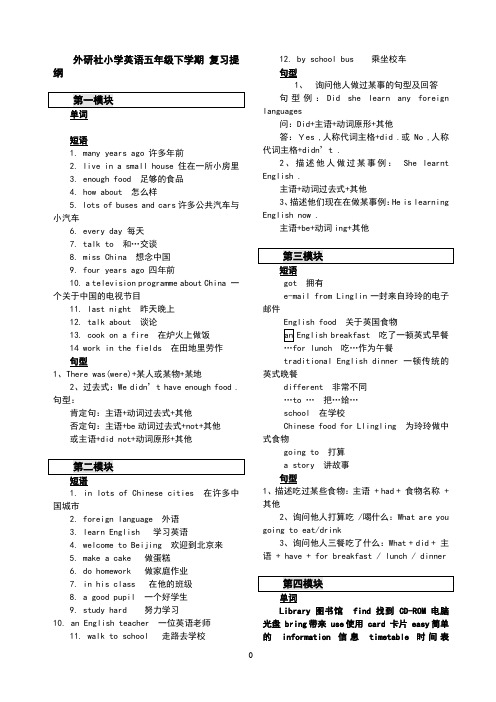
外研社小学英语五年级下学期复习提纲单词短语1. many years ago 许多年前2. live in a small house 住在一所小房里3. enough food 足够的食品4. how about 怎么样5. lots of buses and cars许多公共汽车与小汽车6. every day 每天7. talk to 和…交谈8. miss China 想念中国9. four years ago 四年前10. a television programme about China 一个关于中国的电视节目11. last night 昨天晚上12. talk about 谈论13. cook on a fire 在炉火上做饭14 work in the fields 在田地里劳作句型1、There was(were)+某人或某物+某地2、过去式:We didn’t have enough food .句型:肯定句:主语+动词过去式+其他否定句:主语+be动词过去式+not+其他或主语+did not+动词原形+其他短语1. in lots of Chinese cities 在许多中国城市2. foreign language 外语3. learn English 学习英语4. welcome to Beijing 欢迎到北京来5. make a cake 做蛋糕6. do homework 做家庭作业7. in his class 在他的班级8. a good pupil 一个好学生9. study hard 努力学习10. an English teacher 一位英语老师11. walk to school 走路去学校12. by school bus 乘坐校车句型1、询问他人做过某事的句型及回答句型例:Did she learn any foreign languages问:Did+主语+动词原形+其他答:Yes ,人称代词主格+did .或 No ,人称代词主格+didn’t .2、描述他人做过某事例:She learntEnglish .主语+动词过去式+其他3、描述他们现在在做某事例:He is learningEnglish now .主语+be+动词ing+其他短语got 拥有e-mail from Linglin一封来自玲玲的电子邮件English food 关于英国食物English breakfast 吃了一顿英式早餐…for lunch吃…作为午餐traditional English dinner 一顿传统的英式晚餐different 非常不同…to …把…给…school 在学校Chinese food for Llingling 为玲玲做中式食物going to 打算a story 讲故事句型1、描述吃过某些食物:主语 + had + 食物名称 +其他2、询问他人打算吃 /喝什么:What are yougoing to eat/drink3、询问他人三餐吃了什么:What + did + 主语 + have + for breakfast / lunch / dinner单词Library 图书馆 find 找到 CD-ROM 电脑光盘 bring带来 use使用 card 卡片 easy简单的information信息timetable时间表- 0 -dictionary字典 newspaper 报纸短语1. want to 想要为妈妈制作一张电子卡片3. be good at 擅长4. go to the library 去图书馆5. find a book about e-cards 找到一本关于电子卡片的书6. at the library 在图书馆7. the book about computers 关于电脑的书8. on Shelf C 在C架上9. library card 借书卡10. bring back 带回来11. in two weeks’ time 在两周时间内12. use our computer 使用我们的电脑13. be easy with 用……很简单14. find out 找到、找出15. in this dictionary 在这本词典里16. on this CD-ROM 在这张光盘上17. in this newspaper 在这张报纸上18. at the zoo 在动物园19. on TV 在电视上句型询问某物在何处及回答的句型:1、Where are the…about…,please2、Where can you find out about …3、You can find out … in / on …短语1. take it to China 带它到中国2. buy you a new one 给你买一个新的3. this black bag 这个黑包4. two pockets 两个口袋5. big and light 又大又轻6. be easy for you 对你来说很容易7. at the department store 在百货商店8. a panda on it 有一个熊猫在上面9. be too…for 对…来说太…10. take…to…把…带到…句型1、描述事物特征的句型:It’s get…(big反义small,heavy反义light,easy反义hard)2、表达看法:It’s + 形容词 + for +人称代词宾格短语1. of course 当然2. photos of China 中国的照片3. in the west of China 在中国的西部4. go there 去那儿5. last year 去年with your mother and father 和你的妈妈、爸爸一起去7. stay with 和…呆在一起8. in July 在七月9. live there 住在那儿10. every year 每年11. Li people 黎族人12. visit her friend 拜访她的朋友13. ride a horse 骑马14. climb the Tianshan Mountain 爬天山15. visit the Tianchi Lake 参观天池16. have a lovely time 度过一段愉快的时光17. a lot of /lots of 许多句型1、人称代词和物主代词的区别和用法;2、用方位词表达地点:It’s in the nort h/ south / east / west of….短语1. send an email 发送电子邮件2. a computer message 电脑信息3. from…to … 从…..到…..4. a good idea 一个好主意5. an idea 一个主意6. click on 点击7. write your message 写你的信息8. at work 在工作9. an email from little Tom 一封来自小Tom的电子邮件10. make a poster 制作海报11. thank you for… 为……而感谢12. work hard 努力工作- 1 -13. at the office 在办公室14. be busy 忙碌的15. be home 在家16. at seven o’clock 在七点钟17. on the train 在火车上18. stand up 起立19. run to the blackboard 跑向黑板20. on the blackboard 在黑板上句型1、another和the other : another用于三者以上的“其中一个”,the other用于两者之间2、英语时间的表达:①10:00 ten o’clock②1:58 one fifty-eight ③7:10 ten past seven ④9:48 twelve to ten ⑤4:45 a quarter to five ⑥9:30 half past nine短语1. come quickly 快来2. on the phone 在通话中3. be excited 激动的4. in the summer 在这个夏天5. take a present for my cousin 为我的堂弟带一份礼物6. a Chinese dragon kite 一个中国龙的风筝7. the same as 与…..相同8. I think so ./I don’t think so. 我认为这样./我认为不这样9. go to a party 去参加聚会10. wear a beautiful dress 穿着漂亮的衣服句型1、表示建议的几种方法:(1)What about …. ……怎么样(2)Why don’t you … 你为什么不……呢(3)How about … ……怎么样2、形容词比较级的构成:短语1. in English 用英语2. last week 上周3. go to a children’s theatre 去儿童剧院4. wear women’s clothes 穿女人的衣服5. wear men’s clothes 穿男人的衣服6. tell jokes/ tell a joke 说笑话7. laugh a lot 大笑,笑个不停8. after the show 表演之后9. go to a restaurant 去餐馆10. be ready for….. 为……做好了准备11. your trip to America 你去美国的旅行12. last night 昨天晚上13. in three weeks /in three weeks’ time 在3个周的时间内14. buy …for… 为……买……15. a book about Chinese history 一本关于中国历史的书16. ask you some questions 问你一些问题17. borrow a bike for you 为你借一辆自行车18. CDs of Chinese songs 中国歌曲的光盘19. listen to 听20. in the evenings 在晚上21. See you soon. 再见句型描述某人过去、现在、将来做某事:1、主语 + 动词过去式 + 其他2、主语 + be + 动词ing + 其他3、主语 + be going to + 其他短语1. feel nervous 感到紧张2. make a list of things to do 列一个要做的事情的清单3. go to the airport 去飞机场4. this weekend 这个周末5. go there 去那儿6. at the airport 在飞机场7. in a yellow taxi 乘一辆黄色的出租车8. tall buildings 高楼9. speak English/Chinese 说英语/汉语- 2 -10. make Chinese food for me为我制作中国的食物句型“will + 动词原形”表示将来的动作或状态,构成一般将来时态。
外研社小学英语五年级unit5知识点归纳

第五单元一、重点词汇mine我的your你的,(你们的)his他的hers她的theirs他们的,她们的ours我们的climbing(正在)攀爬eating(正在)吃playing(正在)玩jumping(正在)跳drinking(正在)喝sleeping(正在)睡觉二、掌握的短语climb tree爬树play football踢足球look at看a beautiful painting一幅美丽的画in the kitchen在厨房play with each other 一起玩耍drink water喝水listen to music听音乐read books读书三、名词性物主代词和形容词性物主代词表示所有关系的代词叫做物主代词,即表示事物主人的代词。
它包括名词性物主代词和形容词性物主代词。
第一人称第二人称第三人称形容词性物主代词my我的our我们的your你的,你们的his/her/its他的/她的/它的their她们的,他们的,它们的名词性物主代词mine ours yours his/hers/its theirs注意:1、形容词性物主代词相当于一个形容词,不能单独使用,后面需要跟名词,常用来修饰、限定后面的名词。
如:This is my book(这是我的书)、That is his bag(那是他的书包)2、名词性物主代词需独立使用,后面不能跟名词,它相当于“形容词性物主代词+名词”。
如:It’s mine.(它是我的)四、动词ing形式的变化规则变化规则例词一般动词直接在词尾加-ing read→reading(读)talk→talking(交谈)sing→singing(唱歌)study→studying(学习)以不发音的e结尾的动词,先去e再加-ing write→writing(写)skate→skating(滑冰)ride→riding(骑)drive→driving(驾驶)以重读闭音节结尾且末尾只有一个辅音字母sit→sitting(坐)cut→cutting(切,割)口诀记忆:动词-ing很好记,一般情况直接加。
最新外研版五年级英语下册期末复习辅导资料及答案全套

最新外研版五年级英语下册期末复习辅导
资料及答案全套
一、单词研究
- 1. 单词:单词的拼写和发音
- 2. 中文意思:单词的中文意思和用法
- 3. 例句:运用所学单词造句
二、语法练
- 1. 句型转换:将给定的句子进行相应的转换
- 2. 选择题:选择正确的答案填入横线处
- 3. 完形填空:根据上下文内容选择正确的词填入空白处
三、对话练
- 1. 根据对话内容填空:根据对话的上下文,在空白处填入适当的单词
- 2. 根据对话回答问题:根据对话的内容回答相应的问题
四、阅读理解
- 1. 根据短文判断正(T)误(F):根据短文的内容判断下面的句子是对还是错
- 2. 根据短文选择正确答案:根据短文内容选择正确的答案
- 3. 完成短文:根据短文的上下文,填入合适的词完成短文
五、写作练
- 1. 写作题目:根据给定的题目进行写作练
- 2. 写作要求:对写作进行相应的要求和指导
- 3. 词汇提示:提供相关的词汇和短语供写作使用
- 4. 写作范文:提供一个范文供参考和研究
以上是《最新外研版五年级英语下册期末复习辅导资料及答案全套》的内容概述,请根据需要选择相应的练习进行复习。
祝你成功!。
- 1、下载文档前请自行甄别文档内容的完整性,平台不提供额外的编辑、内容补充、找答案等附加服务。
- 2、"仅部分预览"的文档,不可在线预览部分如存在完整性等问题,可反馈申请退款(可完整预览的文档不适用该条件!)。
- 3、如文档侵犯您的权益,请联系客服反馈,我们会尽快为您处理(人工客服工作时间:9:00-18:30)。
Season 季节:春天spring 夏天summer 秋天autumn 冬天winter Week星期星期一:Monday星期二:Tuesday星期三:Wednesday 星期四:Thursday星期五:Friday星期六:Saturday星期天:SundayMonth:月份一月January 二月February 三月March四月April 五月May六月June七月July八月August九月September十月October十一月November十二月December数字1 one2 two3 three4 four5 five6 six7 seven8 eight9 nine10 ten 11 eleven12 twelve13 thir teen14 four teen15 fif teen16 six teen17 seven teen18 eigh teen19 nine teen20 twen ty30 thir ty40 for ty50 fif ty60 six ty70 seven ty80 eigh ty90 nine ty☆十几是-teen 几十是–ty25:twenty-five 71:seventy-one34: thirty-four 52:fifty-two☆十位数和个位数之间的“—”千万别忘记节日:Easter 复活节①an spring festival; 一个春天的节日②children wear Easter hats (with chicks and flowers); 孩子们带(有玩具鸡和花的)复活节帽子③people give children chocolate eggs.Halloween 万圣节①an autumn festival;一个秋天的节日②children wear scary clothes to scare the people; 儿童们穿着吓人衣服去吓人③people give children sweets. 人们给孩子糖果Mother’s Day 母亲节Father’s Day 父亲节Christmas 圣诞节Thanksgiving 感恩节Fool’s Day 愚人节Teacher’s Day 教师节Women’s Day 妇女节Children’s Day 儿童节单词:year 年before 以前duck 鸭子playground 操场heavy 重的lift 提,抬sell 卖country 国家sometimes 有时restaurant 饭馆night 夜晚why 为什么invitation 请柬reply 回复mine 我的yours 你的hers 她的his 他的both (两者)都whose 谁的skirt 短裙laugh 笑safe 安全的line 排,列morning exercises早操(复fire 火inside 在…里面well 好地true 真实的point 分team 队thirty-six 36 blind 盲的special 特别的hear 听见water 水should 应该break 休息miss 想念rule 规则kind 友善的study 学习bored 无聊的nothing 没什么短语:look different 看起来不同feed the duck 喂鸭子on the playground 在操场上feed the duck 喂鸭子lots of+(名词复数)许多go shopping 去购物go to the supermarket 去超市scary clothes 吓人的衣服an autumn festival 一个秋天的节日birthday party 生日派对write an invitation 写邀请卡have lunch 吃午饭tidy up 打扫the last month of the year 一年的最后一个月get fifty points 得了50分catch the ball 接球play basketball 打篮球make a cake 制作蛋糕run fast 跑得快jump high 跳得高in England 在英国blind people 盲人open the door 开门ride a bike 骑车a special dog 一种特殊的狗do morning exercises 做早操sit in line 坐成排at break time 在休息时间every day 每天play chess 下棋think about 想make a surprise present 做一个惊喜的礼物drink water 喝水go out 出去play with …玩…take off 拿下来make a mess 一团糟fall off 掉下help sb 帮助某人一般疑问句Be动词提问:Are you…? Is he…? Was she…? Were they…? 助动词提问:Do you…? Did he…? Does Sam…?情态动词提问:Can you…? Should we…?☆怎么提问怎么答。
肯定Yes, ….否定No, …一、反义词:heavy 重的—light 轻的jump high跳得高—jump low 跳得低tall 高的—short矮的run slow 跑得慢—run fast 跑得快open 开—close 关after 之后—before 之前big 大的—small 小的new 新的—old 旧的fat 胖的—thin 瘦的far 远的—near 近的safe 安全的—dangerous 危险的happy 开心的—sad 伤心的fool 愚蠢的—clever 聪明的easy 简单的—difficult 困难的well 好地—poor 差地play basketball well 打篮球打得好☆动词+well,一般well放句末good 好的—bad 坏的good student 好学生☆good+名词二、情态动词can/should:Can+动原能干…例:I can run fast. 我能跑得快。
I can sing well. 我能唱得好Can’t+动原不能干…例:I can’t play basketball. 我不会打篮球。
I can’t do it. 我不会做。
Should+动原应该做…例:we should go home. 我们应该回家。
She should life the bag. 她应该提包。
Shouldn’t+动原不应该做…例:They shouldn’t touch the skirt. 他们不应该碰短裙。
Lingling shouldn’t play with the toy. 玲玲不应该玩玩具。
二、名词单数变复数规则变化口诀:①名词单数变复数,一般直接+s②sh, ch, s, x结尾,在后加上es③有生命o+es,无生命o+s④y, ye结尾,去掉y, ye 变i+es⑤f, fe结尾,去掉f, fe 变v+es⑥液体,鱼羊肉不变①egg—eggs;chick—chicks;fruit—fruits…②glass—glasses;box—boxes盒子…③有生命:tomato—tomatoes;potato—potatoes…无生命:zoo—zoos;photo—photos;radio—radios收音机…④country—countries;family—families…⑤leaf—leaves树叶;wolf—wolves狼⑥液体:water,soup,tea,coffee…鱼:fish羊(特指绵羊):sheep 肉:beef牛肉,meat,pork猪肉,fish鱼肉名词单数变复数不规则变化口诀:男女儿,脚鼠牙男:man—men 女:woman—women 儿:child—children脚:foot—feet 鼠:mice—mouse 牙:tooth—teeth三、“there be…”句型:这边有…(be动词随主语单复数变化而变化。
)Be动词(随主语单复数变化而变化):am is are (现在)was were (过去)现在:(单)There is +a +名词单数+now. 这边现在有一个…。
例:There is a pond now. 这边现在有一个池塘。
(复)There are +名词复数+now 这边现在有…。
(不止一个)例:There are swings now. 这边现在有秋千。
以前:(单)There was +a +名词单数+before. 这边以前有一个…。
例:There was a playground before. 这边以前有一个操场。
(复)There were +名词复数+ before. 这边以前有…。
(不止一个)例:There were slides before. 这边以前有滑梯。
四、乐器球类/棋类the乐器:球类/—pongplay chess五、现在进行时句子构成:主语+be 动词+动词现在分词(即ing结尾形式)例:We are singing and dance. 我们正在唱歌跳舞。
I am feeding the ducks. 我正在喂鸭子。
Be动词(随主语单复数变化而变化):am is are (现在)was were (过去)动词现在分词变化(即ing变化):(1)一般直接+ing:sing——singing play——playinghappen——happening发生paint——painting画do——doing jump——jumping 跳fly——flying go——going(2)双写:clap——clapping run——running cut——cutting切sit——sitting坐swim——swimming游泳(3)"e"结尾去掉"e" : dance——dancing have——havingskate——skating溜冰write——writing写六、一般将来时“主语动词原形”(be动词随主语单复数变化而变化。
)例:I be eleven. 我将要11岁了。
We go home. 我们打算回家。
第一人称:第二人称:You are going to+动词原形+其他第三人称单数:He/She/It is going to+动词原形+其他第三人称复数:They are going to+动词原形+其他☆区别现在进行时和一般将来时:现在进行时:be+动词ing一般将来时:be going to +动词原形Why 为什么(提问原因)where哪里(提问地点)whose谁的(提问某人的东西)What 什么(提问物体)who 谁(提问人)how 怎么样。
